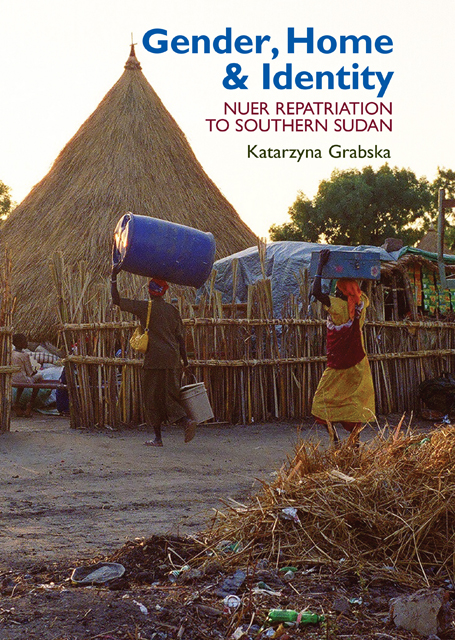Book contents
- Frontmatter
- Contents
- List of Maps and Photographs
- Preface
- Acknowledgements
- Glossary of Nuer Terms
- Acronyms
- 1 Returnee Dilemmas: Dangerous Trousers and Threatening Mini-skirts
- 2 Jiom – Season of Fighting and Running: Conflict, Mobility, Gender
- 3 Mai – Season of Displacement: Becoming ‘Modern’ in Kakuma
- 4 Rwil – Season of ‘Returns’
- 5 Season of Settling-in: Land and Livelihoods
- 6 Tot – Gendered Emplacement Identities, Ideologies and Marriage
- 7 Returnees as Visitors and the Nuer Community: Where Do We Go From Here?
- Epilogue
- Bibliography
- Index
- Eastern African Studies
4 - Rwil – Season of ‘Returns’
Published online by Cambridge University Press: 24 February 2023
- Frontmatter
- Contents
- List of Maps and Photographs
- Preface
- Acknowledgements
- Glossary of Nuer Terms
- Acronyms
- 1 Returnee Dilemmas: Dangerous Trousers and Threatening Mini-skirts
- 2 Jiom – Season of Fighting and Running: Conflict, Mobility, Gender
- 3 Mai – Season of Displacement: Becoming ‘Modern’ in Kakuma
- 4 Rwil – Season of ‘Returns’
- 5 Season of Settling-in: Land and Livelihoods
- 6 Tot – Gendered Emplacement Identities, Ideologies and Marriage
- 7 Returnees as Visitors and the Nuer Community: Where Do We Go From Here?
- Epilogue
- Bibliography
- Index
- Eastern African Studies
Summary
At Home
At home is where we belong
At home is where we make our own choices and decisions
At home is where we are chosen to be leaders
Leaders of our own people
At home is where we talk
Talk about our people’s affairs
Yes east or west home is the best
(Dau, young refugee man, Kakuma)
‘As any displaced and dispossessed person can testify, there is no such thing as a genuine, uncomplicated return to one’s home’ – Edward Said, Out of Place: A Memoir (New York, 1999)
Nyakuol And Kuok
Shortly after my arrival in Lϵr in early January 2007, I visited Nyakuol, the widow I had met in Kakuma. There, she had been a leader of the women’s support group in the southern Sudanese Nuer community and spoke out openly against under-age pregnancies and girls’ lack of access to education. After 15 years searching for refuge due to the civil war in southern Sudan, in December 2006 she and her four children repatriated to Lϵr with the assistance of the UNHCR. Her oldest daughter resettled with a cousin in the USA, while the oldest son chose to stay in Kakuma to complete his secondary education. Nyakuol commented: ‘I wanted to come back to see my family and because my friends were leaving [Kakuma] and I was alone. I wanted to have a permanent place. Kakuma was not home, we were there only because of war’.
Nyakuol’s elder sister, Nyapiny, who returned from Khartoum in 2005, gave her temporary shelter. She lived on a small plot next to the landing strip. Before the conflicts, her family had been influential and prosperous, with large herds of cattle and plots of land. When the war broke out their cattle were killed and the land was taken by the government. Nyakuol’s parents died and her siblings were dispersed. Three sisters and a brother went to Khartoum, while the eldest brother moved to Juba. Nyapiny, like 104 all her sisters, she was a widow, having lost her husband in 2002, while four of her six children died during the inter-Nuer conflict. In 2001, she sent her daughter and her son to Nyakuol in Kakuma.
- Type
- Chapter
- Information
- Gender, Home and IdentityNuer Repatriation to Southern Sudan, pp. 104 - 125Publisher: Boydell & BrewerPrint publication year: 2014

